SLMan Meets… Ultrarunner William Goodge
When I first got into ultrarunning, I didn’t know anything about the sport. I didn’t know anyone in the world of ultrarunning. I just announced I was going to run from John O’Groats to Land's End as my first challenge. I was in LA at the time, in a cryotherapy place, and someone there told me to track down Robbie Balenger, as he was currently running across America. That was my first introduction to ultra people doing a weird, crazy challenge. I watched him from day seven up to day 75 when he finished. We’ve now become really close friends. He's helped me with all my challenges and I’ve helped with some of his. It feels like destiny that it’s all led to this point, doing LA to New York.
The training for this challenge has been interesting. I was in Denver, Colorado for a few weeks – it was -20ºC at times, at 7,000ft, and I was doing lots of miles. Before that, I was at a warm-weather training camp in Cape Town. It was a nice transition: I built up my mileage in Cape Town where it was hot and sweaty, then I went to freezing cold at high elevation in Denver. It was all about training my ‘This is hard’ muscle. I’ll be going through the Mojave desert, Arizona and California, which can sometimes be snowy at this time of year. But the reason I’m doing the challenge right now is because – fingers crossed – it will never get too cold or too hot.
I’m doing the challenge now because I feel ready. It's also something I wanted to do before I turn 30. I'm 28 now and will turn 29 when I'm doing it – it would be nice to close out this decade with a good milestone. A few years ago, I had the idea of doing a marathon in every country in Europe in 30 days. I worked out that I’d have to do each marathon in six hours or less, which I felt okay with, but then lockdown happened and it forced me to do something else instead. I did the 48:30 – that’s 48 marathons, one for each county in England, in 30 days.
All my earliest memories are around sport. Growing up I played football, rugby, tennis and cricket. I would always be on the athletics team. Rugby was something that stayed consistent and I ended up being semi-professional. I grew up in Ampthill, Bedfordshire, and that’s the team I played for. They’re in the championship now. But back when I was 14 or 15, I really wasn't very good – one year, my dad actually asked me if I’d rather take up fishing over rugby.
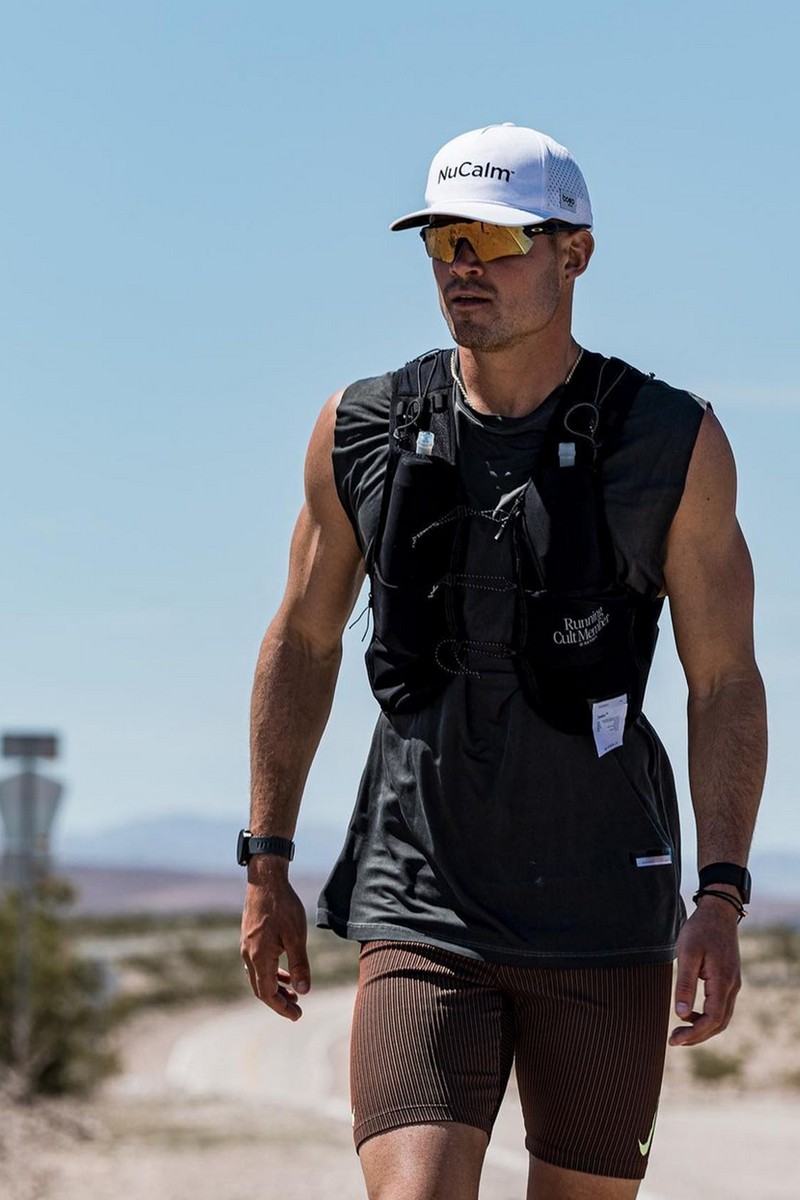
Then I hit puberty and from age 15 onwards I started going to the gym. Once I had that controllable asset in my life, what I lacked in skill I made up for in work ethic. It was probably the first time I exercised mental toughness: I knew that if I had physical presence and was aggressive in what I could do on the pitch, I could be fast, big and strong even if I lacked the skill and natural ability other people had. My success at rugby stemmed from hard work rather than talent or ability.
Then I transitioned from rugby to ultrarunning. Up until about the age of 22 I hated running and didn’t see the point of it. With team sports there’s a victory to be had – there’s tackling, scoring, working with your teammates. In running, it’s a singular action over and over again where unless you’re the likes of Kenyan runner Eliud Kipchoge, you basically don't win. Most people run just to take part. I enjoyed the action of doing it, but I wanted the feeling of winning something.
I made the mental switch when I visited LA to stay with my ex-girlfriend. We were staying in Santa Monica and I had jet lag, so I woke up at 4am. If I was ever going to go for a run for fun, it was on the beach in California when the sun was rising. I left my shoes at reception and ran from the hotel down Santa Monica boardwalk. Initially, I thought I’d run on the sand for 500 metres and then come back, but at some point, I was running on this boardwalk and realised I was actually enjoying myself, the sun had risen and I’d run to the mountains just before you get to Malibu. I couldn’t go any further, so the only thing left to do was run back. That was my first ever long run and I didn't check how far it was until a year or two later – it was 14k. I had my first runner’s high – all those endorphins were flowing from feeling good from doing a long run, which coincided with being excited about seeing this girl. And then my mum called. She was going through cancer at the time, and she told me she was in remission. All these things came together. I can now pinpoint it as being the happiest moment of my life.
My mum passed away nine months later. Her cancer came back. I didn't know why, but if I was ever angry or upset – it didn’t matter what time of day or night it was – I’d go for a run. It quickly became my therapy, and by the time I got back I’d be feeling a little bit better. I realised I was chasing that feeling I’d had that early morning in LA. In the period after she passed away, I kept getting knocked out during rugby and was constantly having concussion tests. I had to take six weeks off. When I tried to go back to rugby, it felt like the shine had been taken away because she had been such a big element of it for me, always watching from the sidelines since I’d been a kid. It was too hard for me to be in that environment without her support. I was 23 at the time, and I definitely could have gone down the path of f*cking it all up. Instead, running gave me an outlet for all my negative emotions.
Now I realise I was probably running away from my problems. Rather than go down the route of drugs and alcohol, running was a different extreme route, although for me it was still a very, very negative act at the start. But I figured out along the way that emotion – especially heightened emotion – equals energy, so you can think of it in two ways. You can think of it like when you're so angry you clench your fists or punch a pillow. That rage is energy. Likewise, you can get the best news ever and use that elated energy. I just decided to channel all this negative stuff into a physical output, which helped me physically and mentally at the same time. That was my biggest learning in life – and now I run for many reasons.
I never thought I’d make running a career. A big part of doing these challenges is raising money for charity and being able to give back. I always get people messaging me saying they've done something for the first time or just got into running or are going through something similar to me. There's been so much positive stuff around me taking up running, it no longer feels like I’m just doing it because I'm sad. The hardest thing I've ever done was the run from John O’Groats to Land's End. I threw everything into that; I can't tell you how much it took from me. Afterwards, it wasn’t like being born again, but there was such a positive transition and I realised it could be a viable career.
I used to make money from rugby and modelling. And if it came to it, I could always do a bit of work for my dad’s carpentry business. I’d do landscape gardening or help out a friend who was a property developer. I was always hands on. Then, when running came around, I dropped the rugby part of things. I didn’t dislike modelling, but it didn’t give me anything other than a good payday every now and again. I started getting positive reinforcement from running and was being booked for modelling jobs and followed on social media because of who I was and my story, rather than what I looked like, so it made me feel better about what I was doing. Then naturally, with social media being such a big element of life now, the sponsorship deals started coming around. And it all stems from my reason for running and the way it’s helped me, so I feel in a very good position where what I do is what I love. I like to think that what I’m putting out there is positive and gets people to dip out of their comfort zone and try something new.
The trip itself is funded by sponsorship. Sometimes it’s brands, sometimes it’s individuals. I've been so lucky – for example, on John O’Groats to Land's End and for 48:30, friends who have construction businesses bought a new van so I didn’t have to hire one, which is a huge expense. Another donated a Mercedes camper van, which was really luxurious with a bed inside, and family and friends helped towards paying for the fuel. Fortunately, having a social media following means it's somewhat easier to get brands involved by giving them exposure in return for food and gels. Derek Rose, the sleepwear company, helped to fund the first documentary. For 48:30, Under Armour sponsored the trip, then for each marathon, different local businesses could pay £500 to get their logo on the shirt I’d wear that day. All this stems from the story I have, but it’s still amazing that people want to get involved and fund things.
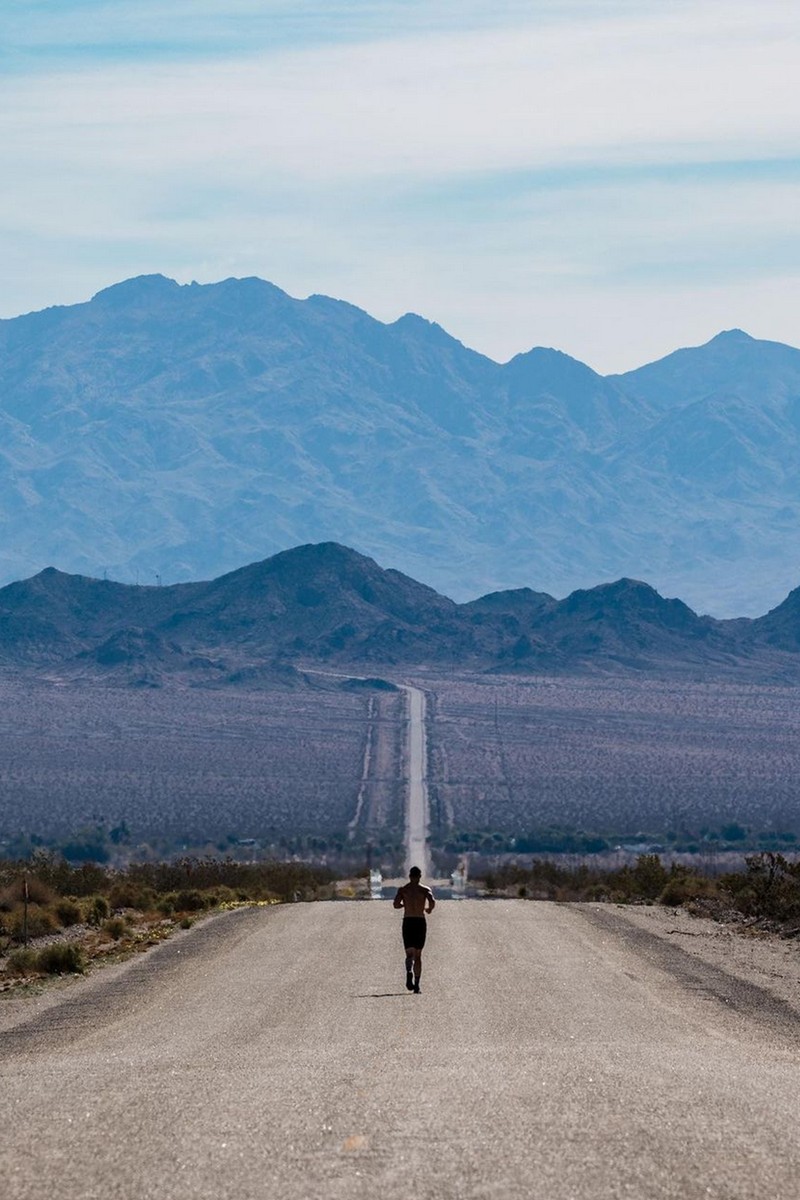
Obviously, this particular challenge is off the scale in terms of costs. I'm super grateful for all the support. NuCalm is the main sponsor and the donations page sits on their site, so they'll get traffic –– plus anyone who donates $15 or more will get a free month’s trial of the NuCalm app. It's one of those things where everyone wins. I’m grateful, because I can't tell you how expensive it all is – it's embarrassing. But I really wanted to make sure on this challenge that the crew got paid. On other challenges, it’s been people helping me out. I'm not very good at accepting help, so the fact that people take a large chunk of time out at personal expense to them… I wasn’t going to do this until we got the finances in place to pay people. I know the guys at NuCalm personally and they’ve been such a big part of the journey and my success, so it feels like a really organic and wholesome way of doing it.
I’ve always been quite mature for my age, but a lot of my growth has come from running and my experiences. If you'd have looked at my life as a model, before I started running, you might have thought, “Wow, he's travelling between London and New York and LA all the time,” but I had massive imposter syndrome and was broke. I was living off credit cards. It looked great if you followed me on social media, as that’s just a shiny take on what you’re actually doing, but I had no real purpose before then. I wasn't doing anything interesting. It’s hard to look at my mum passing away in a positive way, but it is the reason I do what I do now. I have to make her passing away mean something more than just a sad story. The reason I'm so motivated to do what I do all stems from me being so proud of her and what she did as a human being. I’ve made it my superpower.
I never feel nervous before an ultra challenge, as it’s such a long process. The first time I did one, it was the unknown and I had no idea what I was getting myself into, so it was hard to mentally prep, but now I’ve done it, it's almost like I've got the t-shirt. And because that first one from John O’Groats to Land's End was so horrendous, now I feel like I’m always ready. But there’s definitely a switch that goes off in my brain when it comes to prep. When I knew this was definitely happening, I went into a different zone where my priorities in life switched from just having a good time to treating it like gametime. I've been back in the training zone since December, but in a way I felt like I’d always been training for this – all the challenges I've ever done have all lent themselves to this one specific challenge.
My routine is no routine. I need to allow myself the space of 24 hours to do what I need to do, rather than waking up at 6am and going for a run. My life is so varied, I’m on different time zones so often, it's hard for me to get into a routine. I also don't like the pressure of one – I’d much rather get everything done over a week.
That completely changes when I’m in challenge mode. It requires absolute routine and logistics. There are six of us in total. Two guys are filmmakers, who are creating the YouTube series and anything you see on socials. There's Robbie Balenger, who's my running messiah/Yoda. He's lead crew as he's already run across the US and crewed someone else who’s done it, so his knowledge is off the charts. I couldn’t have a better person than him. And then one of my close friends who's good at cooking and good at running is with us. We’ve got similar backgrounds, but he’s a rock ’n’ roll fashion designer – we're different, but we have super strong ties. And there's my cousin Mark, who's doing a lot of the driving. Vehicle wise, we have a camper van that’s just mine. It's got a bed in the back, as it’s important I have my own space when sleeping – I don’t need someone snoring next to me! – and in general, as I’ll be experiencing different levels of emotions! There’s a vehicle that pulls the caravan where the crew all live that has a shower, cooking facilities, three beds and a toilet. Finally, there's a truck on its own that's good for manoeuvrability for picking up supplies.
On the road, I see a support vehicle every five to six miles. The crew will fill up my water bottles, I might have some fuel or take on some food. I won’t physically stop each time, most of the time I’ll just walk through. Sometimes at the start if I'm feeling good, I prefer to keep moving, but there will be times I need to stop. I learnt a routine that really worked doing the 48:30. It was obviously different doing a marathon in every county, as we then had to travel about an hour to get into the next county to start again. But we're doing a similar thing: I'm running from the morning until early afternoon – around 30 miles – then I'll stop, eat something more substantial and have a NuCalm nap for 40 minutes to an hour. If you sleep for 30 minutes, it feels like three hours and takes you down to restorative and REM sleep, which is when your body best recovers. Then I'll wake up for a bit more fuel and I'll go again. I’ve found I come out of this routine way more calm and mentally prepared. It’s much better than doing 50 miles in one long slog, crashing at the end of the day, and doing it all over again the next day.
The wheels will fall off at some stage – and you never know when that might happen. You always get to a point when everything sucks and it’s hard, but then your body adjusts to what you're doing. Generally speaking, it takes two weeks to fully get into this kind of thing. Once you've gone through two weeks, it gets progressively harder and you feel like you want to quit – then your body adapts to what you're doing, you wake up every morning, soak it up and decide, “Okay, this is what we do now.” When I'm on these challenges I'll speak to my individual limbs to encourage them, especially if, say, my knees are sore one day, so I disassociate my mind from my body.
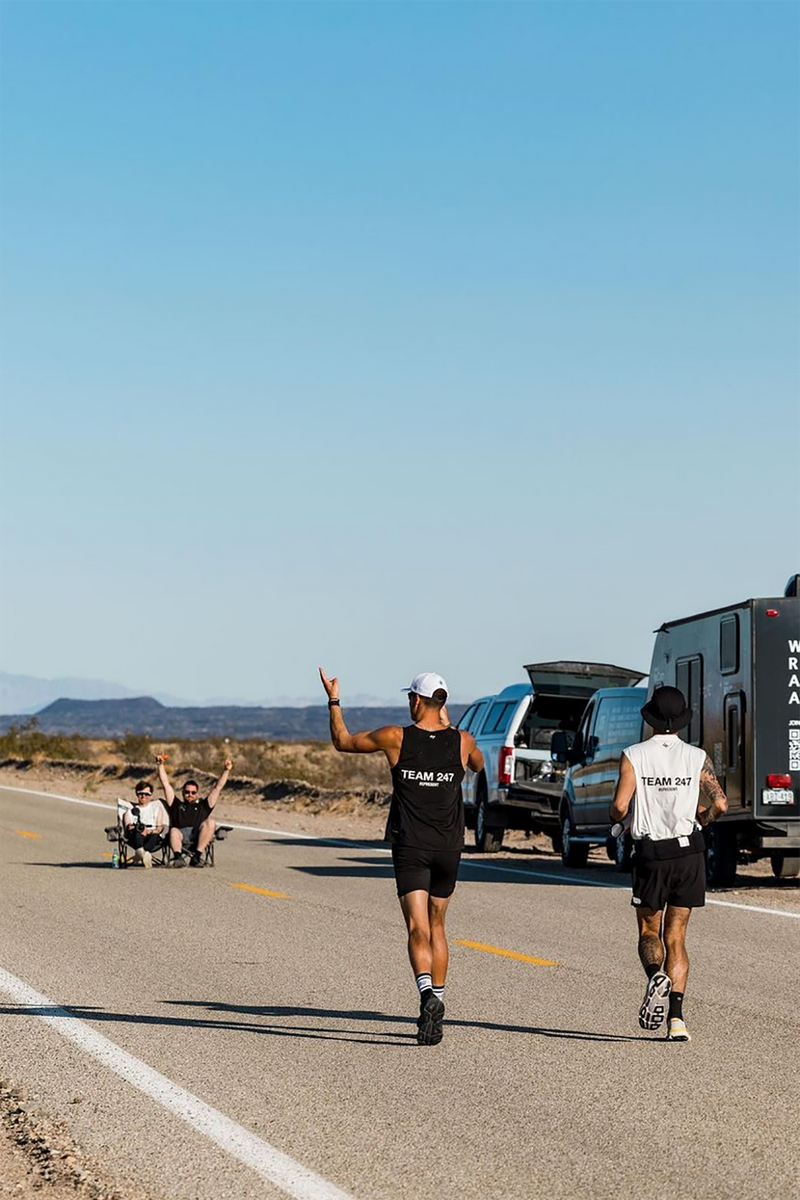
Once a challenge is over, it isn’t easy to return to normal. There will be a real high along the way and when we finish. I’m totally absorbed in just one thing, one narrative and one job every day – my mileage. The crew does everything else for me. When you finish, the elation is naturally followed by a low: “Now what do I do?” Naturally, there’s a lot less interest in the challenge once it’s complete, so people stop caring and you have to re-enter society. It's not easy and I know I'll go through a possible two-week comedown where I'm not hyped about anything. But it’s also a time of reflection – you need a cool-off period to consider what you've done.
When it’s all over, I'll probably go on holiday. I’ll have about 10 days left on my ESTA so it will be nice to relax then head home to see family and friends back in my small hometown in Bedfordshire. But after that, I have a plan to live in 12 different places for a month each for my 30th year on earth. The idea isn’t fully formed, but it’s largely based around international events and festivals – such as Rio carnival and Purim in Israel. I don't want to do the normal touristy stuff. I want to find what the locals are doing. I’ll still be running – as that's my way of exploring and expressing myself – but I have this fantasy where I will learn to cook with someone that knows the local cuisine, like a grandma who’s lived there her whole life. It’ll be a year of learning – I've surfed before, but I'd like to learn to surf properly, and I’d love to get my skydiving, free diving and motorbike licences.
I really respect the version of myself I was when I did my very first challenge. That's why I've been chasing to get to that same level of being physically and mentally destroyed – and I’m certain I’m going to experience that on this challenge. But the other thing I’m really proud of is raising over £100,000 for charity. MacMillan have told me what that money goes towards, which is really rewarding. It’s a great cause and I saw what the MacMillan nurses did for my mum, so knowing that I funded two of those nurses for a year is incredible. This time, I’m raising money for MacMillan in the UK and the American Cancer Society, because they do something similar with support but also fund cancer research, so it's nice to feel like I’m hitting cancer from both sides.
To keep up with William’s challenge, follow him on Instagram at @WilliamGoodge and watch his daily roundups on YouTube. You can donate to his fundraising efforts here.
DISCLAIMER: We endeavour to always credit the correct original source of every image we use. If you think a credit may be incorrect, please contact us at [email protected].
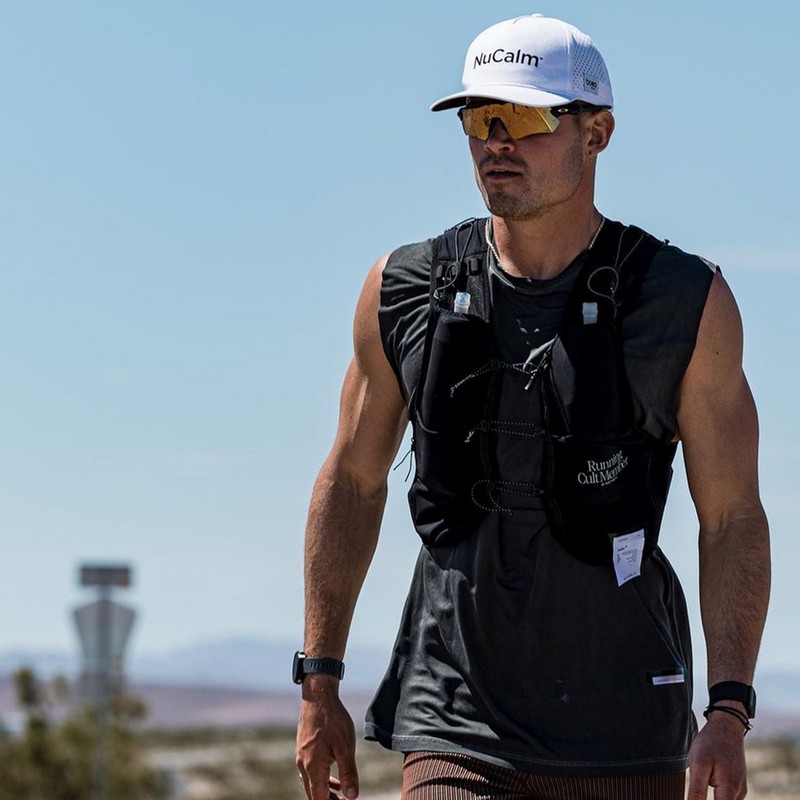
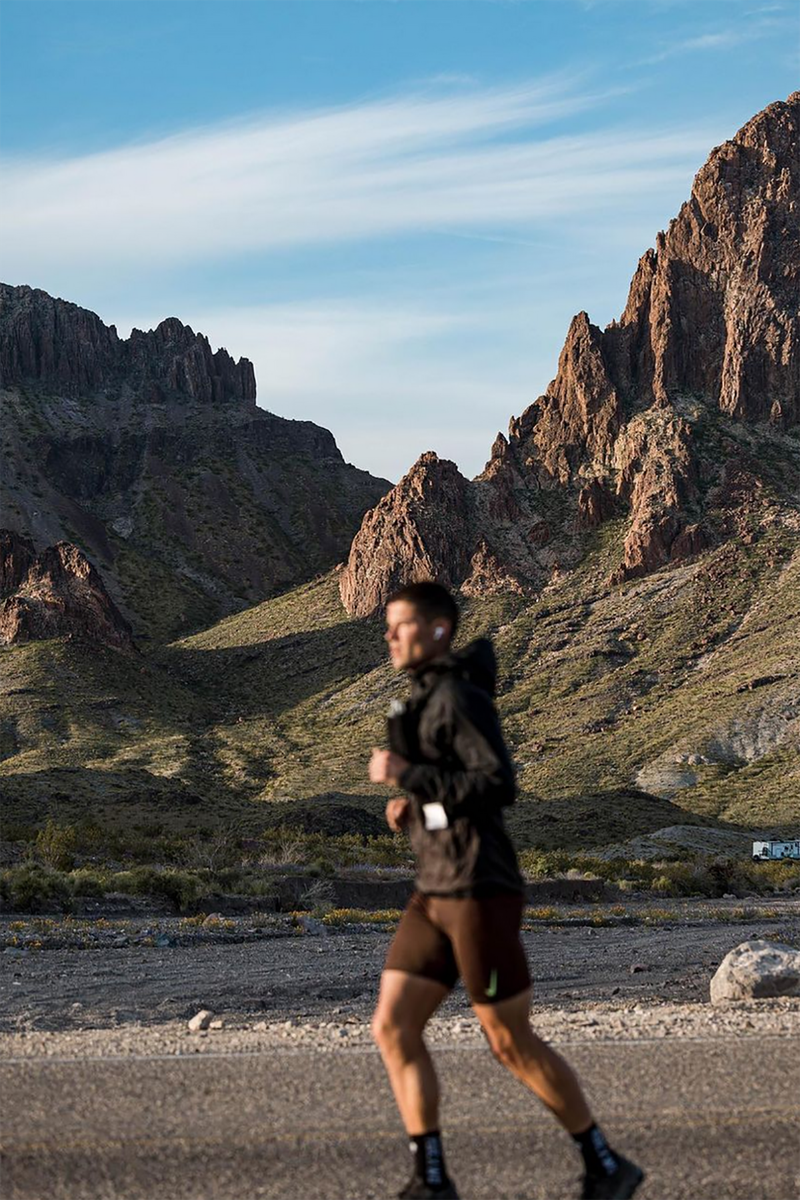
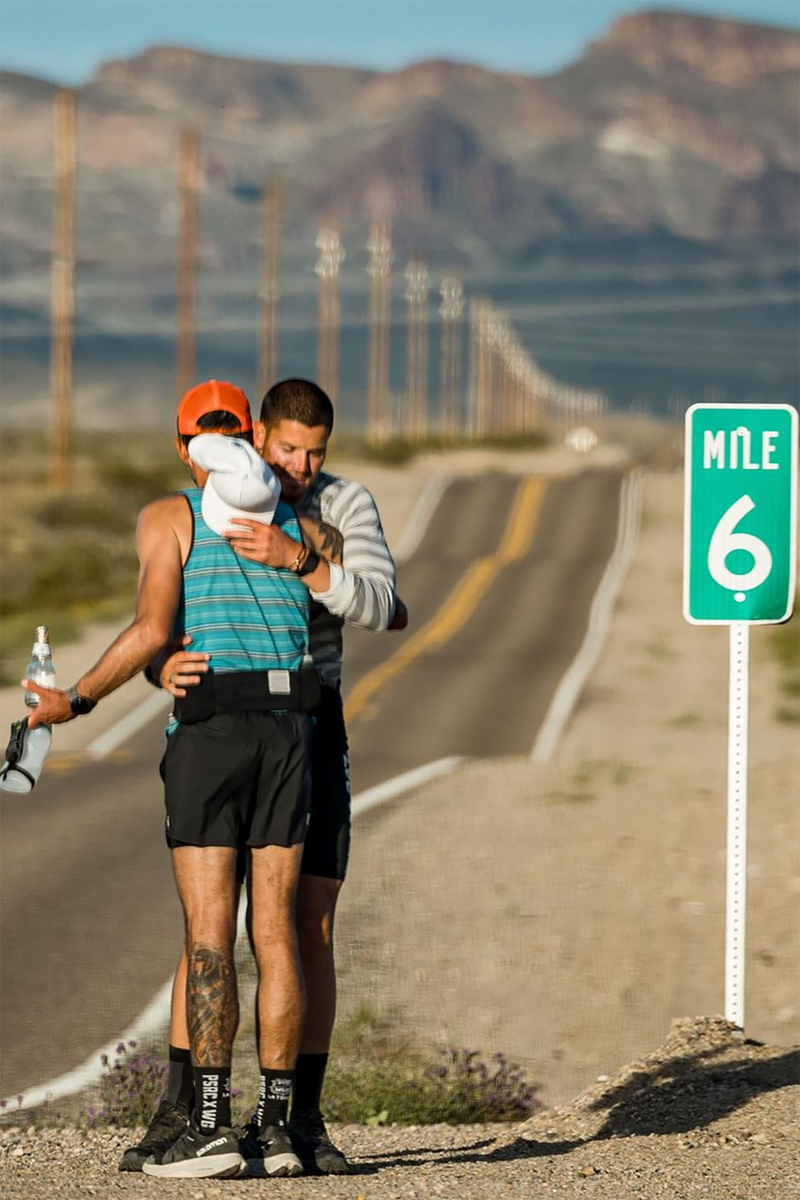
/https%3A%2F%2Fslman.com%2Fsites%2Fslman%2Ffiles%2Farticles%2F2023%2F04%2Fcomp-goodge-copy-2_0.png?itok=cJgiqjce)

